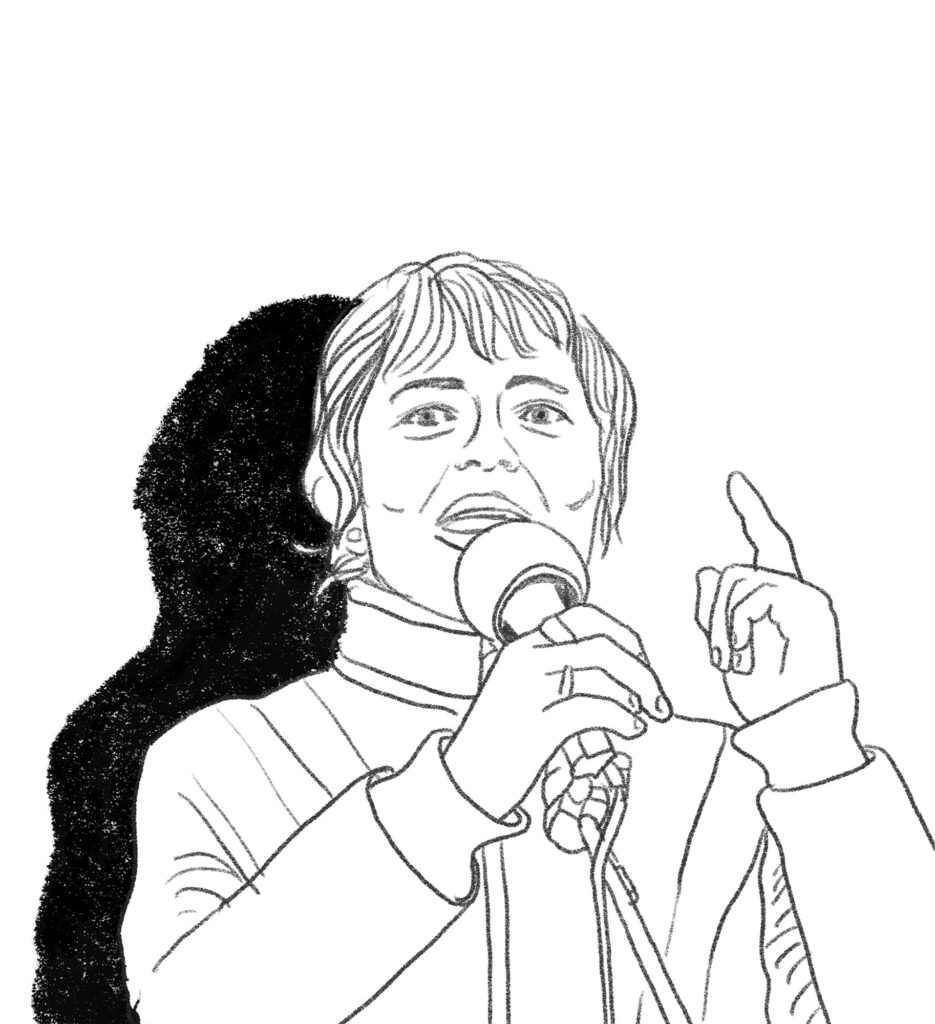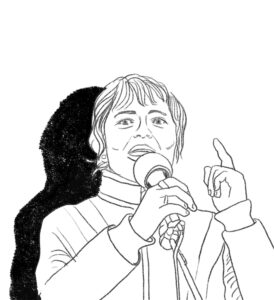Karine Clément is a French sociologist who specialises in social mobilisation, the sociology of labour and the working classes. After living and working in Russia for several years, she returned to France in 2018, and became interested in the gilets jaunes (yellow vests) protests that were happening in the country.
The following year she was scheduled to deliver a lecture on the French movement at a conference in Russia, but was refused entry by the border guard. That is how she learned she had been banned from Russia for 10 years, “in order to ensure the defence or security of the state.”
In this interview with Mayday, we talk about propaganda, democracy, and the prospects for an anti-war social mobilisation in Russia.
Up to 71% of people in Russia supported Putin’s “special military operation,” according to polls in March 2022. Is support for the war in Ukraine really so widespread in Russia?
I don’t think anybody knows the answer to that question. And to be honest, I think that even the majority of the Russian people don’t know what to think. It’s such a dramatic event. It’s total anarchy and it’s a difficult thing for people to get their heads around. This is Ukraine we’re talking about. The majority of Russians have family or friends there. They always thought of it as a sister country. With the same religion, the same culture, the same language. And now, they have to believe they are sending bombs that way? It’s not possible—so it must be an invention of the west. It’s a reaction of self-defence to this absolute chaos. Besides, it’s difficult to gauge the situation from over here in France, and surveys in Russia are known to be unreliable. In general, people in Russia tend to reply whatever they think is wanted of them. And now that everyone knows what they are meant to think, or they risk being arrested, people are even more scared to say anything else.
What is the cultural context that brings this about?
Well, having lived for a long time in the Soviet Union, Russians know only too well what the “blah-blah-blah” is. They can spot it right away. They know how to spot the phraseology that comes from the television, or from the institutions. They know that there are two things: discourse and practice, and that they are distinct. According to a study I did shortly before I had to leave the country, the majority of the people in Russia do not actually believe propaganda. They know it’s indoctrination. This has to do in part with a cynicism that comes from the experience of the Soviet Union. Most Russians will only believe what they see, and are usually distrustful of empty words and rhetoric. Aside from this, there is a tendency to conform. Publicly at least, it is best not to show oneself as different from the masses, or what they think the masses are—to avoid standing out, which can put you at risk.
You mention that people can spot propaganda, and yet many do not believe there is a war. How can this be explained?
In Russia, war is the most important thing that must be avoided since the second world war. It’s inscribed in the people’s memory, it’s inscribed in the culture. Anyone will say: we’re ready to endure anything as long as there is no war. As long as there isn’t a war, it’s ok. And now, we would be the ones waging war on someone else? We would be the aggressor—not even defending ourselves? That’s something very difficult to wrap your head around. Especially given that propaganda keeps showing that it’s not a war, it’s a special military operation to defend the Russian people in the Donbas. And if anything, to stand up to the west. This demonisation of the west plays a big role here. It is a feeling that is very widespread in Russia.
The Russian population looks upon the west with a bad eye, because it is perceived as the force that caused, or heavily contributed to, the collapse of the Soviet Union. And especially as the force imposing the ultra-liberal and violent capitalist reforms of the 1990s, which caused the coal mines to close down, the savage privatisation of businesses which made the oligarch rich, and plunged the rest of the country into destitution. All of that is amplified in Russia by Putin’s propaganda, which makes people believe that all of this is because of the west. And people have reason to believe this, because international competition and western governments played a major role in what happened in the 1990s. The speed of change and the suffering this caused to the great majority of the population—that experience is still felt today.
In terms of the ideological implications of this war, do you think that there is still a legacy of communism in Russia that is also incompatible with the west’s world view?
Putin today keeps not even an ounce of the old communist ideology or its practices, so it has nothing to do with that. And communism was discredited in a harsh way during the 1990s, and that’s still the case today. But a certain “Marxism in the kitchens,” if you like, during informal discussions, continues to exist in the way people find their way in the world and relate to each other. So this rejection of the west could be partly linked to the communist past, but I think above all it’s due to the fact that the west is perceived as the cause of the financial, political and geographical breakdown of Russia. The west stood by and watched, as if it didn’t give a damn about the fate of the Russian population.
It’s also worth noting that democracy isn’t at all part of the values and principles defended by the Russian population, except maybe for a small minority. And to be honest, from their point of view, they have every reason to distrust democracy—in any case as a catchphrase. Because the democracy that was sold to them in the 1990s, when people said: “I am for democracy, vote for me. Against communists, for democracy!” It meant poverty. The shutting down of the factories, the failed payment of salaries, contempt for the working classes, and easy money obtained with fists and guns. Democracy was the “far west.” You can’t entice Russians and tell them: “what about democracy?” That’s never going to work, because they’ve seen what it is, and they don’t want any more of that.
In this sense, western sanctions are only going to strengthen this resentment. If the aim is to encourage the population to rebel against the regime, isn’t this rather likely to backfire?
So far, sanctions haven’t yet dramatically upset the quality of life, but I think that time will come. In any case, it’s worth stressing that the majority of the population already lived under very bad conditions. After the 1990s, in the 2000s— at the beginning of Putin’s rule—the quality of life picked up. But in 2014 came Crimea and the sanctions started. The ruble crisis, etc. Now it’s getting worse again. So for the majority of the population, things were already not great. The sanctions will be felt more at a later stage, but it’s not obvious that people will make the connection to the west, even if the propaganda is pointing in that direction. Because people are used to having inflation here, sanctions and financial problems there. What is certain is that the sanctions are having the biggest impact on the middle classes who used to have an international lifestyle. They travelled, they consumed western products, they needed foreign currency. Paradoxically, this is the category of people that we’ll be seeing the most of in the west. They are the ones who are leaving the country. But these are not necessarily the people who are the most against the war.
What else might the west do to shake up Russian society?
The way I see it, the shock has to be to the oligarchy: oil money, gas money, the money that is financing the war. Targeting the oligarchy by blocking their bank accounts— Russians who have billions outside of the country—but this will never be done. To stop paying for oil and gas would mean that we in the west will suffer too. But that would be the only way of really turning off the tap. Do you think that it will be possible to convince the Russian population that they are waging a war? I don’t know how long it will take. It’s difficult to have exact numbers, but there are already hundreds of dead among the Russian soldiers. And when their coffins start returning to Russia, it will be difficult to hide the brutal reality under the veil of this mythology that’s being constructed. It’s difficult to know what to do with them. Especially because the first coffins that will come back contain mostly conscripts, that is people who have signed contracts to serve because they come from the poorest parts of Russia, from the remotest regions, and they need this money to feed their families. They were sent as cannon fodder to kill Ukrainians, without a real explanation. I would say that Putin is waging war against Ukraine, but also against the Russian people. So it will change no doubt, as the first coffins will arrive and people will start experiencing the economic difficulties due to sanctions and also the cost of the war.
The huge expenses incurred by Putin will raise concerns too. Will there be money left to pay for pensions? We don’t know. And so, when the economic consequences of the war affect a large part of the population, maybe the Russians will react. Because it’s a misconception that the Russians are uninterested in politics. The working classes, in any case, are critical of the government and Putin’s policies, especially in terms of domestic policy. In terms of foreign policy, they don’t know much about it. It’s not a part of their everyday life experience, so they can delegate it to politicians. But when the economic consequences are going to be felt, it will be a concrete experience of war that enters people’s daily lives. And that may lead to mobilisation. You’ve studied social mobilisation in France with the gilets jaunes.
How does that compare to your experience of social mobilisation of the working classes in Russia?
When I arrived in France, which was around the time of the gilets jaunes protests, I recognised people from the Russian working classes. It’s the same language, it’s the same culture, the same type of criticism. Except that the French were much more mobilised and much more politicised. They led a large-scale fight, over a long time, whereas the Russians’ were much more scattered, local struggles. In Russia—certainly this was the case in 2018, before I left, but it’s not likely to have changed— there is a strong, widespread feeling of powerlessness. We can’t do anything against the wall of money, the powerful oligarchy and against those who control the army. We are very small, of no consequence, we can do nothing against this.
Whereas in France, for example, I’m talking about the gilets jaunes as a revolt of the working classes—whether we agree with it or not—for a long time, they did nothing. They also suffered the closure of factories, precarious labour conditions, and so on, without doing anything. They misplaced their trust in the unions, which turned out to be rotten, and the political parties, all of them rotten too. Then they realised this new path was wrong. Well, they rose up and all of a sudden, seeing each other rise up, rebelling, they started to believe in their power to build themselves up as political actors. They overcame—very quickly and masterfully—their feeling of powerlessness. This has never happened in Russia, in any case not on this scale and unfortunately, it’s unlikely to happen. So, I’m rather pessimistic about that.
Do you think that a real democracy is possible, and desirable in Russia?
I am wholeheartedly for the defence of Ukraine, for denouncing Russian imperialism. Or even better: the imperialism of the Kremlin and its oligarchic clique, Czarist imperialism. I am even in favour of military aid to Ukraine because without weapons, solidarity with the Ukrainian people does not count for much. They will end up squashed by the Russian military giant. However, this is not the same as defending democratic values, or a dichotomy between a democratic camp against an authoritative camp. By defending Ukraine, I do not defend democracy. I would love to, but it’s not the case.
By defending Ukraine, I defend the victim of an imperialist aggressor who wants to annihilate another country. There are at least three countries that are not going to recover from this war any time soon, even if it stops now. They are Ukraine, Russia and Belarus. What is happening in Ukraine is terrible, of course, but the other countries will also suffer. But supporting Ukraine, no, it’s not flying the flag for democracy. We, as democratic countries, did nothing for years after the conflict started. Putin annexed Crimea. We did nothing. The reforms of the 1990s, which plunged the Russian population into poverty and self-hate. We did nothing. We applauded and even helped it along. Despite all the good words, oligarchs will always be welcome in the west as long as they spend their money and give us gas and electricity. So no, it has nothing to do with democracy. I think each people should build their future in the way they understand it. To choose for themselves how they want to be governed and to create a real possibility for participation. This could be democracy, but not the representative kind as we conceive it in the west—which is in crisis anyway.
One last question. It’s hard not to feel helpless in this situation. Is there anything that we, citizens of Europe and the world, can do?
Yes, absolutely. You can help Ukrainian refugees who come here. You can spread information from a wide array of sources. Not just from one point of view. Because it’s a complete mess. There is so much propaganda coming from all sides—Nato, the United States, Russia, Ukraine— that it’s difficult to know what information we can trust. Another thing we can do is to listen. Keep an ear out and give some credit, trust and respect to the words of people from other societies who are not necessarily like us, and do not necessarily express themselves in the same way.




